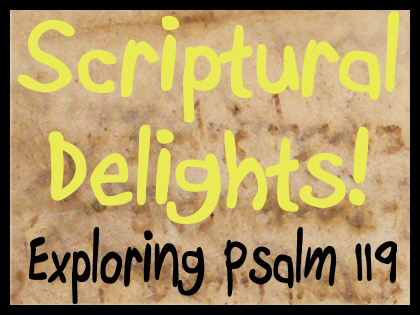
432.4K
Downloads
3365
Episodes
G’day and welcome to Partakers Christian Podcasts! Join us for uplifting Bible teaching, inspiring readings, heartfelt worship, powerful prayers, and fascinating church history. Whether you’re new to faith or growing deeper in your journey, we’re here to encourage and equip you. 🎧 Tune in, interact, and be inspired—wherever you are in the world.
G’day and welcome to Partakers Christian Podcasts! Join us for uplifting Bible teaching, inspiring readings, heartfelt worship, powerful prayers, and fascinating church history. Whether you’re new to faith or growing deeper in your journey, we’re here to encourage and equip you. 🎧 Tune in, interact, and be inspired—wherever you are in the world.
Episodes

Sunday Feb 02, 2025
Scriptural Delight 02 - Psalm 119 - Words for Scripture
Sunday Feb 02, 2025
Sunday Feb 02, 2025
Words for Scripture
Welcome back to our series based on Psalm 119. This is the second in our series. Throughout Psalm 119, the writer has 8 different words for Scripture or "Law of the Lord". When the Psalmist says "God's Law", "Law of the Lord" or Torah, he does not mean, as some think, just the Mosaic law, but rather all of the revealed will and mind of God in the Old Testament scriptures. We, of course, don't know how much of the Old Testament was written when the Psalmist was writing Psalm 119, but we do know that he would have had at his disposal at least the first 5 books, the Pentateuch. That's Genesis, Exodus, Leviticus and Deuteronomy to you and I. Additionally, it is also quite probably some of the historical books and maybe even the book of Job.
So with that brief introduction lets investigate these 8 words. Of course our modern translations don't always use these words, but rather, these are root meanings of the original Hebrew words.
1. Commandments: This word, commandment, signifies a direct order from authority. It is not simply power to influence but rather the right to give orders and an attitude of assuredness.
2. Law: The first word to share is "law" and it is the most common of all the words used here in Psalm 119. It has as its foundation the word "teach" or "direction" and can be synonymous with one commandment or a whole book of laws to be followed. It shows that God's revealed will is not simply for observation only but is primarily for obedience!
3. Ordinance: Within the Old Testament, this would be judgements or decisions as laid down by a supremly wise Judge. But its more than judgements, because it also signifies the justice of being dutiful and responsible.
4. Precepts: this word is drawn from a person who is a manager or inspector, looking into a situation and getting ready to act. This word reflects the finer detail or specific instructions as laid down by the Lord.
5. Promise: Very similar in nature to "Word", its root or foundation is from "to say" or "promise to do or say". God's promises are true - He keeps His promises! For a quick example: throughout the Old Testament, God's people, Israel, had the promise of the Messiah - not only for themselves but for the whole world! In the New Testament, we see this promise fulfilled - with Jesus Christ being the long-waited for Messiah.
6. Statutes: When the Psalmist speaks of statutes, he writes about the permanence of Scripture, as an enduring reminder of the Lord and His goodness.
7. Testimonies: This means that what God says is a reliable witness, a witness that is faithful, dependable and true. Rules & high standards for practical and obedient godly life with warnings against disobedience abound within this expression.
8. Word: This the most popular expression used by the Psalmist, simply means God's revealed truth in any shape, form, commandment or statement.
Of course for those of in the 21st century, Scripture or "Law of the Lord" is not confined to the first five books of the Old Testament or even the whole Old Testament. No! Scripture for us also includes the New Testament. We have the benefit of being able to read and study the Old Testament with the understanding and eyes of the New Testament. So many Christians only look at, study and preach the New Testament. But Scripture is all 66 books, all revealing God's timeless truths.
Here in Psalm 119, the Psalmist equates 8 key words about God's revealed word: Law, Testimonies, Precepts, Statutes, Commandments, Ordinances, Word and Promises. They are not meant to be seen as 8 individual words, but rather 8 distinct aspects of God's revealed word in Scripture. For the Psalmist, at least the Pentateuch and probably some of the histories.
For Jesus and the first Christians, the Old Testament and later on some of Pauls's writings as attested to by Peter:
"Bear in mind that our Lord's patience means salvation, just as our dear brother Paul also wrote you with the wisdom that God gave him. He writes the same way in all his letters, speaking in them of these matters. His letters contain some things that are hard to understand, which ignorant and unstable people distort, as they do the other Scriptures, to their own destruction. (2 Peter 3v15-16)
Hopefully by the end of these series of studies, you will have found a new delight in reading your Bible: all 66 books of it including perhaps some that you have never read before!
And now for you to ponder: Ask yourself how you view the Bible, how you read it, why you read it and do you listen to God speaking to you as you do so?


No comments yet. Be the first to say something!